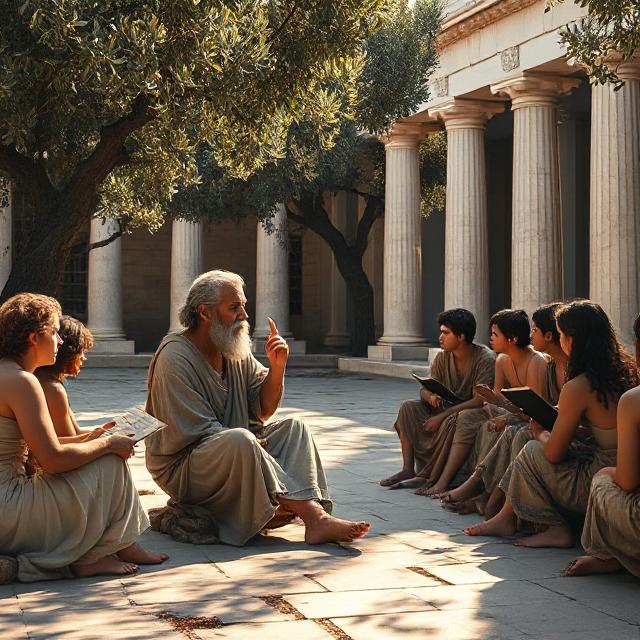
Table of Contents
How Socrates Shaped Western Logic
Introduction: Before Socrates, There Was Rhetoric
In ancient Athens, wisdom was often equated with clever speech. The Sophists taught the art of persuasion—not truth. But then came Socrates, a barefoot philosopher with a sharp tongue and a relentless thirst for clarity.
Rather than lecture or boast, Socrates would ask questions. He’d challenge assumptions, press for definitions, and leave his opponents speechless—not because he won an argument, but because they realized they didn’t know what they thought they knew.
His legacy? The foundations of Western logic. Before Aristotle systematized logic, Socrates lived it.
I. The Socratic Method: Dialectic over Dogma
At the heart of Socratic thought is the Socratic method, or elenchus—a form of dialectical questioning designed to expose contradictions and refine thought.
Structure of the Method:
- Ask a simple question.
What is justice? - Receive an answer.
Justice is telling the truth and repaying debts. - Challenge it through examples.
Is it just to return a weapon to a madman? - Expose contradictions.
- Refine or abandon the original claim.
Result: The conversation destabilizes assumed knowledge and replaces it with deeper insight or acknowledged ignorance—aporia.
Why it matters: This is proto-logic—not formal yet, but methodical, rigorous, and essential for reasoning.
II. Definitions Over Appearances
Socrates didn’t care about appearances or reputation. He cared about essences—what things truly are.
Where Sophists aimed to win arguments, Socrates aimed to define terms clearly:
- What is justice?
- What is virtue?
- What is courage?
In doing so, he taught that clear thinking requires clear language—an idea foundational to logic, mathematics, and science.
III. Logic Begins in Conversation
Unlike formal logic that would later arise under Aristotle, Socratic logic was conversational.
He used:
- Reductio ad absurdum: Pressing a belief until it collapses under contradiction.
- Inductive reasoning: Drawing general principles from specific examples.
- Aporia: Ending in confusion to stimulate further thought.
Socrates wasn’t solving logic puzzles—he was training minds. This approach evolved into the dialectic of Plato and the syllogism of Aristotle.
IV. Socrates vs. the Sophists: Truth over Technique
The Sophists taught students to argue any side persuasively. Socrates taught them to seek truth, even if it made them unpopular or uncertain.
| Sophists | Socrates |
|---|---|
| Relativism | Objective truth |
| Rhetoric | Definition |
| Persuasion | Understanding |
| Payment for teaching | Refused to charge |
| Practical gain | Moral development |
Key Insight: Logic begins with the commitment to truth-seeking, not just clever argument.
V. Socrates as Midwife of Reason
In Plato’s Theaetetus, Socrates compares himself to a midwife—helping others “give birth” to their own understanding.
Rather than pour knowledge into his students, he drew it out by questioning their assumptions. This maieutic method (from the Greek maieutikos, “midwifery”) is the essence of conceptual clarification—a key element in philosophical and logical analysis today.
VI. Socratic Ignorance: “I Know That I Know Nothing”
Socrates claimed to be the wisest man in Athens—not because he had all the answers, but because he knew his own ignorance.
This humility is foundational to logic:
- It guards against fallacies.
- It promotes openness to counterarguments.
- It prioritizes evidence and reasoning over ego.
The logical thinker, like Socrates, begins by admitting what they don’t know.
VII. Socratic Influence on Western Logic
Though Socrates left no writings, his influence shaped generations:
- Plato developed Socratic dialogue into a theory of Forms and dialectic.
- Aristotle formalized logic into syllogisms, categories, and rules of deduction.
- Medieval logic relied on Socratic questioning in scholastic debates.
- Modern science and law use structured questioning and adversarial reasoning rooted in Socratic practice.
Even today, critical thinking curriculums worldwide teach elements of the Socratic method.
VIII. Socratic Legacy in Law, Science, and Education
- Law: Cross-examination in court mimics Socratic probing.
- Science: Hypothesis testing and falsifiability echo Socratic logic.
- Education: The Socratic seminar remains a staple of discussion-based learning.
Key takeaway: Wherever reasoning is valued, Socrates lives on.
IX. Common Misconceptions About Socrates
| Myth | Truth |
|---|---|
| Socrates had a formal theory of logic | He practiced logic informally—through dialogue |
| Socratic questioning gives answers | Often it raises better questions instead |
| Socrates was anti-political | He was deeply engaged in civic life |
| The Socratic method is just arguing | It’s actually about seeking deeper clarity and truth |
TL;DR Summary
- Socrates shaped Western logic by using dialogue, questioning, and definition to uncover truth.
- His method exposed contradictions and refined ideas—laying the groundwork for formal logic.
- He prioritized truth over rhetoric, clarity over cleverness.
- His influence persists in law, science, education, and philosophy.
Final Reflection: Socratic Logic Is a Way of Living
For Socrates, logic wasn’t just a tool—it was a way of life. A commitment to clarity, intellectual honesty, and self-examination.
His famous line—“The unexamined life is not worth living”—isn’t just a challenge to think; it’s a call to reason through life.
And that’s the essence of logic: not cold calculation, but the disciplined pursuit of understanding, moment by moment.
